Corsair Performance Series Pro (256GB) Review
by Kristian Vättö on May 14, 2012 9:10 AM EST- Posted in
- Storage
- SSDs
- Corsair
- Marvell
- Corsair Performance Pro
Random Read/Write Speed
The four corners of SSD performance are as follows: random read, random write, sequential read and sequential write speed. Random accesses are generally small in size, while sequential accesses tend to be larger and thus we have the four Iometer tests we use in all of our reviews. Our first test writes 4KB in a completely random pattern over an 8GB space of the drive to simulate the sort of random access that you'd see on an OS drive (even this is more stressful than a normal desktop user would see).
We perform three concurrent IOs and run the test for 3 minutes. The results reported are in average MB/s over the entire time. We use both standard pseudo randomly generated data for each write as well as fully random data to show you both the maximum and minimum performance offered by SandForce based drives in these tests. The average performance of SF drives will likely be somewhere in between the two values for each drive you see in the graphs. For an understanding of why this matters, read our original SandForce article.
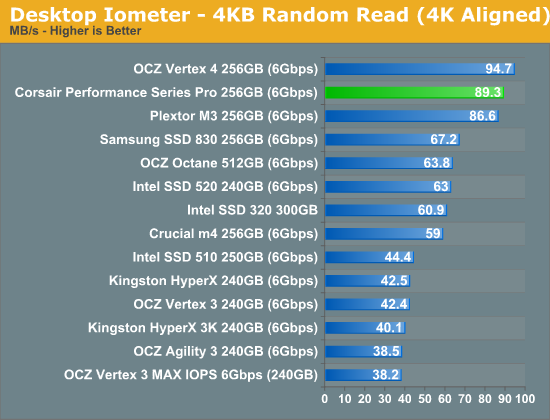
Performance Pro's random read performance is slightly faster than Plextor's M3's but there is essentially no difference. In general the random read performance is excellent, as expected.
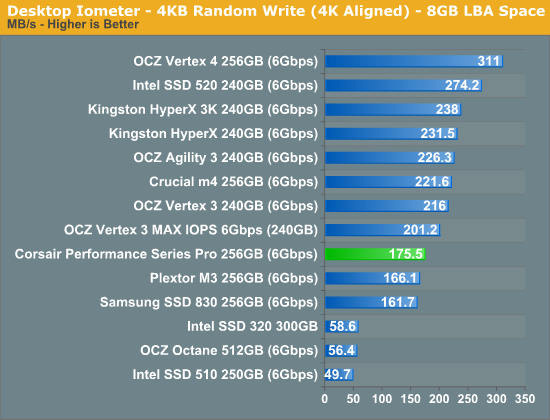
Random write performance is not top-notch but still ~6% faster than what Plextor's M3 provides.
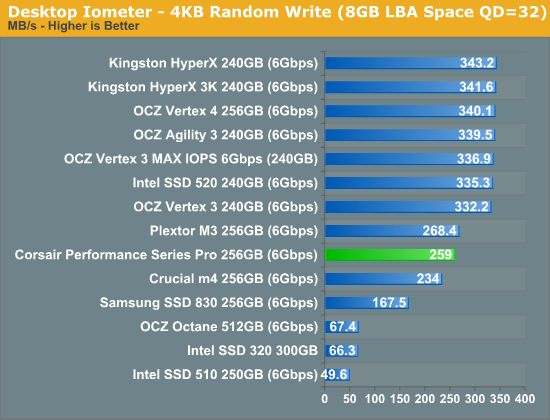
Increasing the queue depth shows an increase in random write performance but this time the M3 is a bit faster. We are only looking at a difference of ~4% though, and it should be noted that most workloads don't use queue depths higher than 5.
Sequential Read/Write Speed
To measure sequential performance we ran a one minute long 128KB sequential test over the entire span of the drive at a queue depth of 1. The results reported are in average MB/s over the entire test length.
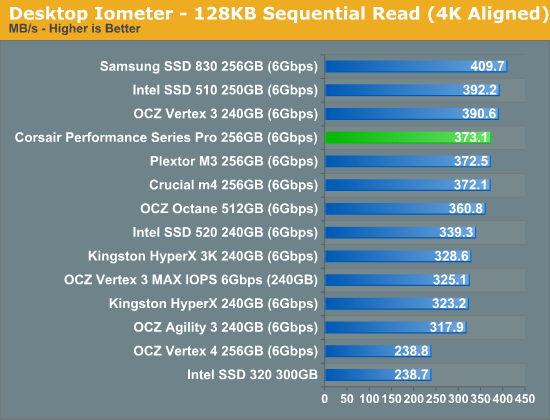
Again, identical performance with Plextor M3 and this time Crucial's m4 joins the chorus as well.
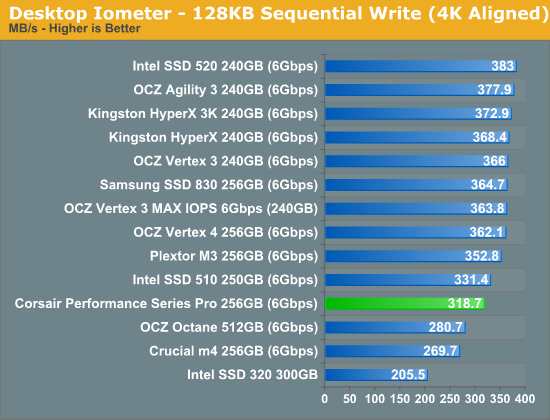
Sequential write introduces some surprises. Plextor M3 is 34MB/s (10.7%) faster here while in other tests the two were much closer to each other. However, one shouldn't pay too much attention to just one test and our Storage Suites should give a much better look at real world performance.










41 Comments
View All Comments
FunBunny2 - Monday, May 14, 2012 - link
-- Only Intel uses in-house firmware whereas the rest use the firmware that SandForce provides.OCZ seems to say that they do their own firmware. How to know which is which?
SilthDraeth - Monday, May 14, 2012 - link
Doesn't Samsung use their own firmware also?Operandi - Monday, May 14, 2012 - link
Samsung uses their own everything.vol7ron - Monday, May 14, 2012 - link
Can someone do a follow-up to see that those Sequential Read numbers are right for the Vertex 4?It just seems odd that the Vertex-4 bested the Vertex-3 on everything, but was significantly lower with Seq.Read
SSD_Privacy - Thursday, May 17, 2012 - link
Yes Samsung does, but does it erase your data when it says it does? The Corsair, OCZ etc.?http://www.usenix.org/event/fast11/tech/full_paper...
According to this paper SSD's are very insecure. One drive reported that the data was gone when in fact all of the data was recoverable.
Which drive was that? This paper does not tell us that. It would be very helpful if Anandtech would replicate this study and tell us which drives performed in what capacity. Much more helpful than whether drive A performed a write/read 10kb/sec faster than drive B.
appliance5000 - Friday, May 18, 2012 - link
I might be misunderstanding what's being said here, but unless you do a "secure empty trash" all that's happening when you empty the trash is that you're telling the computer that it can write over the sectors that were "emptied". The trashed data is actually still there until overwritten and thus recoverable. This is true with all drives.SSD_Privacy - Saturday, May 19, 2012 - link
SSD drives do not store data as platter drives do. An SSD drive has a controller on board that is independent of the operating system. Data is stored all over the drive at random and tracked by the controller and firmware. When you use Secure Delete Trash or Eraser on a file stored on a platter drive it will erase the data, but used on an SSD the operating system is blind to the actual location of the file.The controller removes data using its firmware "garbage collection" to prepare it for new writing. In addition, some drives have significant space that is not accessible by the user that stores and rewrites data, so if you do a full wipe none of that data will be wiped. Also some data was found to be recoverable on one drive after twenty wipes had been performed due to how the wipe was implemented by the controller on that SSD.
exallium - Monday, May 14, 2012 - link
I believe Crucial uses the Marvell controller on the M4Kristian Vättö - Monday, May 14, 2012 - link
To clarify: I was referring strictly to SandForce based SSDs. Only Intel has a custom firmware in their SandForce based 520 and 330 series SSDs - other OEMs use the firmware that SandForce provides.When we hop off the SandForce train, custom firmwares are much more common. Samsung makes everything from DRAM to firmware, Micron/Crucial uses Marvell controller but everything else is in-house, OCZ uses (possibly custom) Marvell controller in Vertex 4 but in-house firmware, and so on.
Tommyv2 - Monday, May 14, 2012 - link
How come there's no Plextor M3 Pro review, or at least including it in the charts? That's the one to beat, not the stock M3. It's supposed to be the "best of the best" of Marvell drives and AT has ignored it...